The Tin Drum
The Tin Drum is about a 3 year old boy living in Germany around the time the Nazis will take power. To rebel against an adult world losing its, Oskar will refuse to stop playing his tin drum and he will deliberately injure himself so that he will stop physically aging. He lives with his doting mother who always worries over him, her mother’s lover, Alfred the abusive Nazi supporter who might be his father, his mother’s other lover, Jan the generically handsome post office worker who happens to be her cousin (!) and could also be his father, and his wise grandmother who disapprovingly observes a country reentering national turmoil. Oskar’s journey will carry him from every aspect of German society from the beginning of the Third Reich until it’s end.
The filmmakers lucked out when they found David Bennett, perhaps one of the best little person actors in film. For the otherwise uncastable role of Oskar, he is absolutely perfect. He is a trouble causing pint sized rebel who has to be played for comedic effect while simultaneously having enough believability and emotional depth to be convincing during the dramatic scenes. Whether playing Oskar at age 3 or at age 20, he is solid and worth the price of admission. The entire film hangs on his performance, and he rises above and beyond for the challenge.
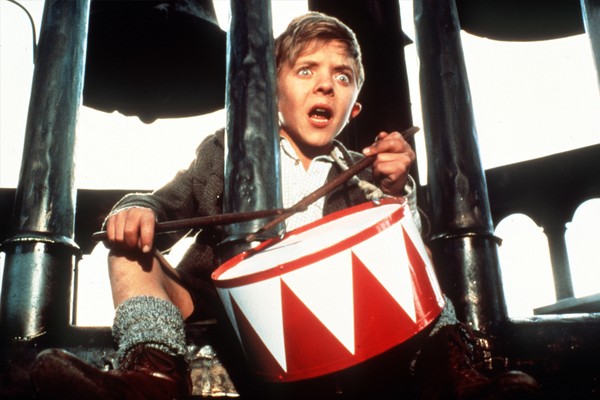
Alfred, one of the mother’s primary lovers is also great in this. He’s a Nazi supporter and overall bastard who is hysterically offensive. Sometimes you enjoy his comic cruelty, other times he crosses the line so far that you want to reach over and slap the hell out of him. At first he appears one note, but somehow by the end, you actually end up feeling sorry for the guy. Normally it wouldn’t work if the character is made out to be that much of an asshole, but Tin Drum takes it’s time with Alfred and makes the moment ring sincere because we’ve been with him for so long.

There are weak links in the cast, such as the mother and the post office worker. Mother doesn’t do much other than act naïve, worry over Oskar, and serve as his means of transportation. Even worse, when it appears that her character would gain momentum with an interesting arc, nothing comes out of it. Which isn’t to say that she isn’t acted well, because she is vibrantly portrayed and is convincingly distraught, but she is just underwritten and doesn’t do anything interesting. In the beginning, Mr. Postman doesn’t really seem to be useful, existing only to look generically handsome and to finger mother at random intervals. His character takes a significant improvement in value when he fights alongside the other Polish rebels against the Nazi forces in one of the best scenes in the film. Mother and the postman aren’t poor enough to kill the film, but they leave the least memorable impressions.
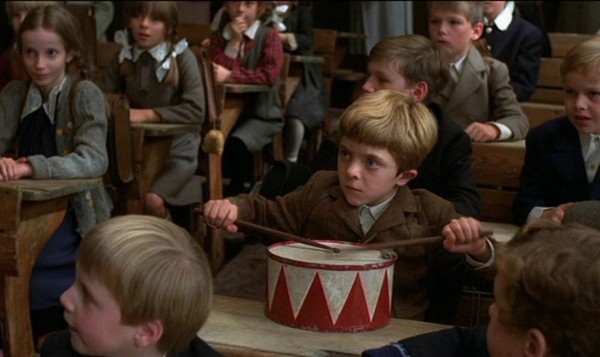
The look of the film itself is kept pretty realistic with little stylized elements. Grey skies, urbane architecture, period appropriate dress. You definitely feel like you’re in 1930’s era Germany. It doesn’t feel that far off from what you would find in other films centered on World War 2. This is used to emphasize the strange imagery of circus performers, midget cabaret shows, eels found in the head of a decapitated horse, and the inside of a womb.
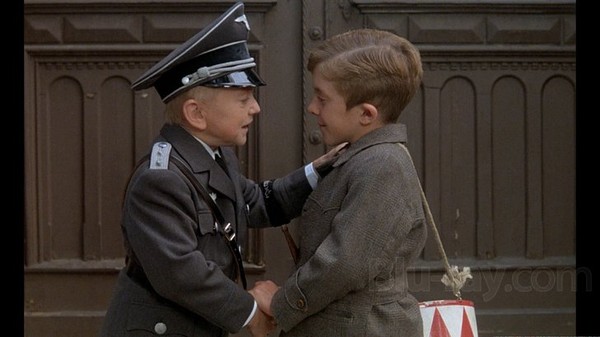 Musically, the film is a winner. The score has tons of variety to it, whether it’s a tragic piano piece during a shootout, circus music played with glasses of water, or a saxophone driven love scene. Every single piece of music in this film is great.
Musically, the film is a winner. The score has tons of variety to it, whether it’s a tragic piano piece during a shootout, circus music played with glasses of water, or a saxophone driven love scene. Every single piece of music in this film is great.
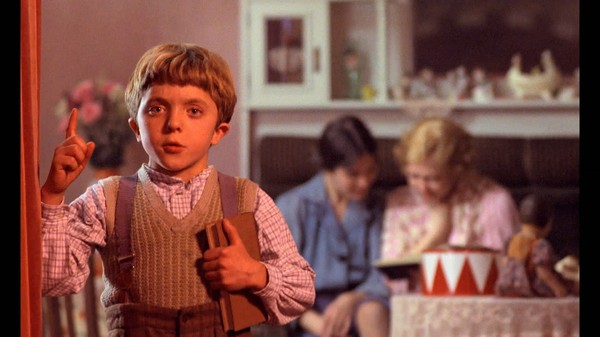
In terms of tone, the feel is cynical and sarcastic, often showing a casual disregard for human life and decency in general with the most kind characters often being the ones being the most abused. Adults are rightfully portrayed as cruel and uncaring, especially amidst their Nazi party fervor. Other children aren’t shown to be much better, especially when a gang of bullies force Oskar to swallow from a stew of urine. The humor mostly comes out of watching the absurdity of human behavior rather than from telling jokes. Nothing is going to make you laugh out loud, but you will find yourself going “hey, that was pretty clever”. Although in the case of the brief interlude of Oskar falling in love, the film can definitely make you cringe. This scene just came off way too creepy and could have easily been left out for time constraints (and to avoid a notorious legal issue that the film faced during the late 90s).

It is a film that is not without warmth however. A strong example would be in the emotional support offered by midget performer extraordinaire, The Great Bebrah, one of few sympathetically portrayed adult figures in the film. He is not in the film for long, but his charming presence uplifts the film momentarily, although by the end this likability is distorted in a moment of wicked irony.
The filmmakers lucked out when they found David Bennett, perhaps one of the best little person actors in film. For the otherwise uncastable role of Oskar, he is absolutely perfect. He is a trouble causing pint sized rebel who has to be played for comedic effect while simultaneously having enough believability and emotional depth to be convincing during the dramatic scenes. Whether playing Oskar at age 3 or at age 20, he is solid and worth the price of admission. The entire film hangs on his performance, and he rises above and beyond for the challenge.

Tin Drum har länge varit på Filmfetts att göra lista men våran hombre Brad fick nog av väntan och gjorde en review själv, tack Brad! Vill man ha något gjort får man görat själv är denna historias moral...asså inte filmen utan ..... händelserna..runt ...reviewn
Alfred, one of the mother’s primary lovers is also great in this. He’s a Nazi supporter and overall bastard who is hysterically offensive. Sometimes you enjoy his comic cruelty, other times he crosses the line so far that you want to reach over and slap the hell out of him. At first he appears one note, but somehow by the end, you actually end up feeling sorry for the guy. Normally it wouldn’t work if the character is made out to be that much of an asshole, but Tin Drum takes it’s time with Alfred and makes the moment ring sincere because we’ve been with him for so long.

Eat your heart out Kevin Mccallister
There are weak links in the cast, such as the mother and the post office worker. Mother doesn’t do much other than act naïve, worry over Oskar, and serve as his means of transportation. Even worse, when it appears that her character would gain momentum with an interesting arc, nothing comes out of it. Which isn’t to say that she isn’t acted well, because she is vibrantly portrayed and is convincingly distraught, but she is just underwritten and doesn’t do anything interesting. In the beginning, Mr. Postman doesn’t really seem to be useful, existing only to look generically handsome and to finger mother at random intervals. His character takes a significant improvement in value when he fights alongside the other Polish rebels against the Nazi forces in one of the best scenes in the film. Mother and the postman aren’t poor enough to kill the film, but they leave the least memorable impressions.

Dear Brad, Markus here, fuck you for all these spaces, do you know how hard it is to come up with shitty sublines? and Merry Christmas
The look of the film itself is kept pretty realistic with little stylized elements. Grey skies, urbane architecture, period appropriate dress. You definitely feel like you’re in 1930’s era Germany. It doesn’t feel that far off from what you would find in other films centered on World War 2. This is used to emphasize the strange imagery of circus performers, midget cabaret shows, eels found in the head of a decapitated horse, and the inside of a womb.

Ummmmmmm...cool....

Christmas, little drummer boy, get it??
In terms of tone, the feel is cynical and sarcastic, often showing a casual disregard for human life and decency in general with the most kind characters often being the ones being the most abused. Adults are rightfully portrayed as cruel and uncaring, especially amidst their Nazi party fervor. Other children aren’t shown to be much better, especially when a gang of bullies force Oskar to swallow from a stew of urine. The humor mostly comes out of watching the absurdity of human behavior rather than from telling jokes. Nothing is going to make you laugh out loud, but you will find yourself going “hey, that was pretty clever”. Although in the case of the brief interlude of Oskar falling in love, the film can definitely make you cringe. This scene just came off way too creepy and could have easily been left out for time constraints (and to avoid a notorious legal issue that the film faced during the late 90s).

Naughty Naugthy Brad
It is a film that is not without warmth however. A strong example would be in the emotional support offered by midget performer extraordinaire, The Great Bebrah, one of few sympathetically portrayed adult figures in the film. He is not in the film for long, but his charming presence uplifts the film momentarily, although by the end this likability is distorted in a moment of wicked irony.
Even as a black comedy, there are still moments of pain that are not there for laughs. Particularly the Polish and German shoot out in the middle of the film. Explosions are loud and crunching, debris flies spectacularly, interiors are torn to shreds, and every gunshot wound looks painful as hell. For a film that can get as goofy as it does, all of the violent scenes are unexpected and shocking.

This is what Oskar looks like today, + he's really really short
World War 2 has been a popular subject for films, but it is safe to say that there is no other World War 2 film quite like The Tin Drum. It’s an era authentic period film that is spiced up with bizarre imagery but never losing the horror and devastation of the actual events. Tin Drum is a film that plays it too bizarre for history buffs, but plays it too straight for an audience that expects nothing but weirdness. It was truly a special time when a film such as this was able to win the Best Foreign Language Film.
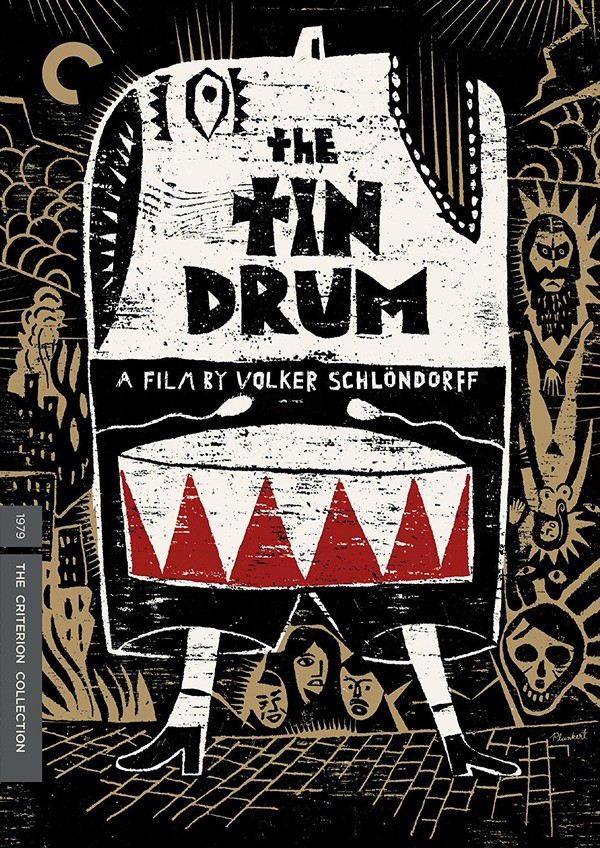 Brad
Brad
